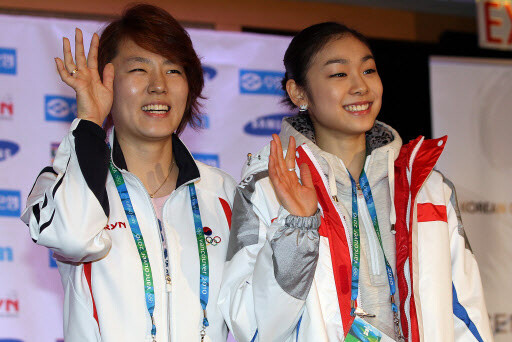hankyoreh
Links to other country sites 다른 나라 사이트 링크
Vancouver Olympic Games usher in welcome cultural changes in S.Korea

South Korea’s athletes and citizens have both show changes in recent history. During past Olympic games, both stressed the color of the medals and boosting national prestige, but this time, they enjoyed the celebration openly even when the athletes did not bring home the gold. Citizens were enthusiastic about athletes simply as fans. Experts praised this as evidence that South Korea’s social conscience is maturing as it acknowledges the value of individual effort and results.
When asked by the Hankyoreh during the Olympics what advice he gave Kim Yu-na prior to the games, Kim’s Canadian choreographer David Wilson said he told her to enjoy skating not for her nation or parents, but for herself.
In fact, during an interview after winning the gold medal on Feb. 26, Kim said she prepared well, and she was pleased to be able to show it. When asked about her competitor, Asada Mao, Kim said all she did only what she wanted and needed to do, and that she did not think of any particular individual as a rival. This was a mindset that showed a sharp contrast from her predecessors, who focused upon their willpower in South Korea-Japan competitions.
Kim could be considered typical of a “globalized generation” that has an active and future-oriented disposition. Kim is not alone. South Korea’s athletes who went to the Vancouver games were not excessively bound up with the “fatherland.” Instead, they tried to accept the results of their own efforts and enjoy the present moment.
The athletes’ transformation also seemed to ‘infect’ the fans. Short track skater Sung Si-bak, who was expected to win gold, won two silver medals instead, but fans visited his homepage and showed support, calling him a great athlete with strong willpower. They even warmly applauded speed skater Lee Gyu-hyeok, who failed to medal in five competitions. Fans were also delighted by the Korean bobsled team, which made the finals on Feb. 28 even though it finished far from medal position, and the ski jump team, which finished near the bottom.
Sports critic Gi Yeong-no said the social trend of greater freedom than the past and valuing the individual is also catching on in sports. He said the Olympics are bringing out the true form of sports, where athletes participate to compete, rather than as a proxy war without gunfire.
Please direct questions or comments to [englishhani@hani.co.kr]
Editorial・opinion
![[Column] Has Korea, too, crossed the Rubicon on China? [Column] Has Korea, too, crossed the Rubicon on China?](https://flexible.img.hani.co.kr/flexible/normal/500/300/imgdb/original/2024/0419/9317135153409185.jpg) [Column] Has Korea, too, crossed the Rubicon on China?
[Column] Has Korea, too, crossed the Rubicon on China?![[Correspondent’s column] In Japan’s alliance with US, echoes of its past alliances with UK [Correspondent’s column] In Japan’s alliance with US, echoes of its past alliances with UK](https://flexible.img.hani.co.kr/flexible/normal/500/300/imgdb/original/2024/0419/2317135166563519.jpg) [Correspondent’s column] In Japan’s alliance with US, echoes of its past alliances with UK
[Correspondent’s column] In Japan’s alliance with US, echoes of its past alliances with UK- [Editorial] Does Yoon think the Korean public is wrong?
- [Editorial] As it bolsters its alliance with US, Japan must be accountable for past
- [Guest essay] Amending the Constitution is Yoon’s key to leaving office in public’s good graces
- [Editorial] 10 years on, lessons of Sewol tragedy must never be forgotten
- [Column] A death blow to Korea’s prosecutor politics
- [Correspondent’s column] The US and the end of Japanese pacifism
- [Guest essay] How Korea turned its trainee doctors into monsters
- [Guest essay] As someone who helped forge Seoul-Moscow ties, their status today troubles me
Most viewed articles
- 1[Column] The clock is ticking for Korea’s first lady
- 2After 2 months of delayed, denied medical care, Koreans worry worst may be yet to come
- 3[Column] Has Korea, too, crossed the Rubicon on China?
- 4Hong Se-hwa, voice for tolerance whose memoir of exile touched a chord, dies at 76
- 5US overtakes China as Korea’s top export market, prompting trade sanction jitters
- 6[Correspondent’s column] In Japan’s alliance with US, echoes of its past alliances with UK
- 7All eyes on Xiaomi after it pulls off EV that Apple couldn’t
- 8[News analysis] After elections, prosecutorial reform will likely make legislative agenda
- 9Samsung barricades office as unionized workers strike for better conditions
- 10More South Koreans, particularly the young, are leaving their religions